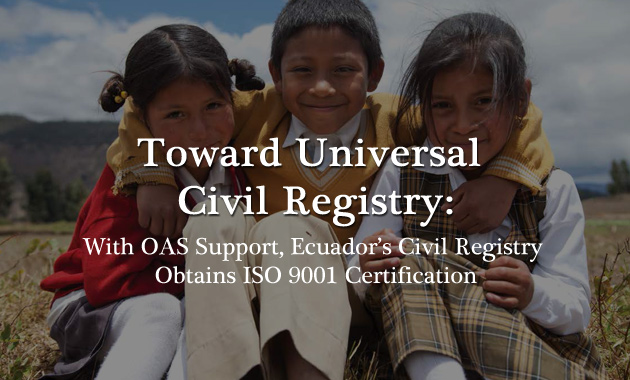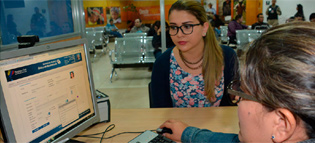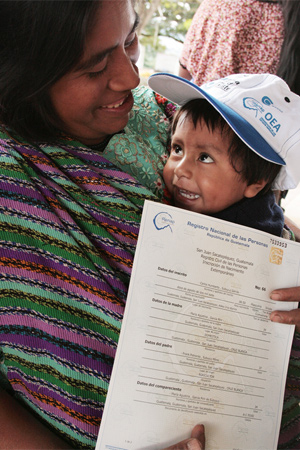- English
- Español
Media Center
Feature

In Latin America and the Caribbean, 3.2 million births (6 percent of the total) are still unregistered.
The registration of all births is one of the 2030 Sustainable Development Goals: Ecuador is on track to achieve it.
Objective 16.9 of the Sustainable Development Objectives: " By 2030, provide legal identity for all, including birth registration."
The registration of citizens is not only a requirement, it is also a need. Registration is a pathway to a life of rights and opportunities, a key that opens the door to basic services such as health, education, protection, food, financial services and social programs. It is also an effective means to combat trafficking in persons and organs, among other crimes. The lack of registration means nonexistence, emptiness, and denial of the person.
In the world there are 229 million children aged 0 to 5 whose births have not been registered, according to data from the United Nations Children's Fund (UNICEF). The Western Hemisphere can boast a registration rate of 94 percent of births, a figure still far from the standard in Europe where universal registration already exists, but positive compared to South Asia where the percentage of registration is only 38 percent or with sub-Saharan Africa, at just 44 percent. The figures, however, do little to help the citizen who cannot access their rights because they lack identity cards, and in Latin America and the Caribbean, there are at least 3.2 million children in that situation.
Alejandro Romero, Veritas Executive, the company that validated the ISO 9001: 2015 Certification Certificate.
That was the spirit that led UN member states to propose, as one of the Sustainable Development Objectives to be achieved in 2030, the complete elimination of underreporting of births. And that same impulse was the one that led the Ecuadorian government to propose, with the support of the Organization of American States (OAS), to improve the efficiency of its civil registry.
The starting point was already positive. In 2000, the registration rate in Ecuador was 88 percent. By 2015, that number had already grown to 94 percent, but the systems proved incapable of further growth.
OAS Support and the ISO 9001: 2015 Certification

In response to a request from the Government of Ecuador, the Organization of American States (OAS) supported the implementation in 2016 of the project: “Institutional strengthening of Ecuador’s civil registry through the certification of internal processes according to ISO 9001:2015 standards.”
The project was implemented by the Universal Civil Identity Program in the Americas (PUICA) and was supported by the Government of South Korea, the Spanish Agency for International Development Cooperation (AECID) and the Government of Ecuador. The project included six stages of implementation: planning, human resources training for senior managers, process documentation, creation of the quality management system, internal audit, and external certification. Thus, more than 300 civil registry officials were trained in the cities of Guayaquil, Portoviejo, Manta, Coca, Ibarra, Otavalo, Riobamba and Quito. 102 processes were also documented, including:
- Birth registration
- Electronic signature management
- Customer service management
- Registration of deaths
- Commercialization of electronic services
- Monitoring of electronic service agreements
- Administration of institutional mobile brigades
- Management of identification services
- Production of identification service
- Validation and enrollment of identification service
- Management of computer architecture
The conclusion of the project was celebrated with a ceremony held on May 11 in Quito, where the Main Directorate of Civil Registry, Identification and Certification (DIGERCIC) officially received the ISO 9001: 2015 Internal Process Certification Diploma.
For the DIGERCIC’s head, Jorge Troya, the certification was the only possible path "to be able to maintain the improvements achieved, and to ensure continuous improvement in the provision of services to citizens." For DIGERCIC, it was essential to support their methods "with internationally recognized models, which also make it possible for us to become a world-class institution. That is why we chose the certification under the ISO 9001 standard."
From the perspective of the donors, the effort paid off and seeing the results makes it worthwhile. "In 2005, under-registration in the region was 18 percent in children under 5 years of age, and currently the average is 6 percent," recalled the Spanish Ambassador in Ecuador, Carlos Abella y de Arístegui, who was also convinced that Ecuador will achieve the ultimate goal: to meet objective 16.9 of the Sustainable Development Goals and register all births.
A Commitment without Borders

Ecuador may well be one of the first to achieve its objective, but it should not be the last. All OAS member countries are committed to the universalization of civil registry, and not only through the ODS.
In 2016, the states of the region gathered at the First Meeting of Ministers and National Authorities in the Americas on the Right to Identity held in Mexico, adopted the commitment to promote policies at the national level that "promote accessibility to identity documents through the implementation of advanced civil registration and vital statistics systems, including simple, free cost, non-discriminatory procedures, safeguarding personal information, and respecting cultural diversity, gender and human rights."
"The successful conclusion of the certification process in Ecuador demonstrates that public administration can and should be a space conducive to innovation and the pursuit of quality"
James Lambert
Secretary of Hemispheric Affairs of the OAS
For the OAS, "the successful conclusion of the certification process in Ecuador demonstrates that public administration can and must be a space conducive to innovation and the pursuit of quality," said the Secretary for Hemispheric Affairs of the Organization, James Lambert. "We celebrate that DIGERCIC is the first civil registry to certify processes under ISO 9001: 2015 standards and we encourage other countries to work together to continue strengthening civil registration institutions."
That idea was echoed by the main beneficiary of the process, the DIGERCIC, whose Director, Jorge Troya, encouraged the civil registries of Latin America and the Caribbean "to communicate this good practice in their own countries, since the whole philosophy of improvement and culture change are the basic factors that will help institutions in the region to accelerate their modernization.”
PUICA

Through PUICA, the OAS is available to support those who, like Ecuador, request it. Since 2010, the Program has implemented technical cooperation projects in 19 member states of Central America, South America and the Caribbean. In addition to its specific support to countries, the initiative is moving towards strengthening policies, public institutions and national legislation, promoting citizen participation and raising awareness of the problem of underreporting, supporting the identification of best practices and promoting International and regional cooperation through the Latin American and Caribbean Council of Civil Registry, Identity and Vital Statistics (CLARCIEV).
In addition to Ecuador, PUICA is currently implementing projects in El Salvador, Guatemala, Haiti, Honduras and the Dominican Republic. Who will be next?
Additional information on the Universal Civil Identity Program in the Americas (PUICA) of the OAS is available here.
(*) ISO 9001 is an international ISO standard developed by the International Organization for Standardization (ISO) that applies to the Quality Management Systems of public and private organizations.
Reference: E-046/17


